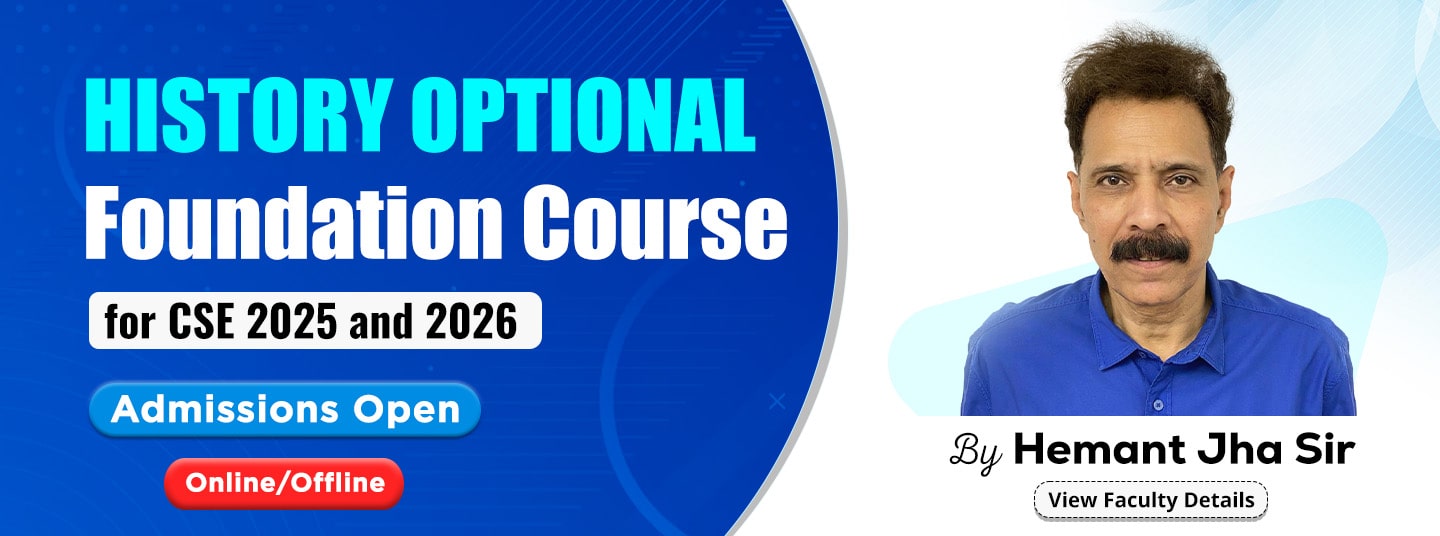
1422, Main Mukherjee Nagar Road,
Near Batra Cinema,
New Delhi-110009
History Optional Foundation Course
Introduction
The History Optional Foundation Course is a specialized program aimed at students and aspirants who wish to choose History as their optional subject, particularly for competitive exams like the Civil Services Examination (CSE) conducted by the Union Public Service Commission (UPSC) in India. History remains a popular choice due to its broad syllabus, rich content, and overlap with General Studies papers. This foundation course equips candidates with the fundamental knowledge and analytical skills required to excel in the subject.
For further details on History as an academic discipline, visit Wikipedia’s History article.
Why Opt for History as an Optional Subject?
- Extensive Syllabus: History offers a vast syllabus covering ancient, medieval, modern Indian history, and world history, providing a deep understanding of the development of civilizations.
- General Studies Overlap: Many topics in the History optional syllabus coincide with General Studies, particularly GS Paper I, which covers Indian heritage, culture, and world history. This overlap allows for efficient preparation.
- Analytical Subject: History is not just about memorizing facts; it requires an understanding of cause-effect relationships, analysis of events, and the ability to view history from different perspectives. This makes it appealing to those who enjoy critical analysis.
- High Scoring Potential: History, as an optional subject, offers high scoring potential for candidates who can present well-structured answers backed by strong factual information.
Importance of a Foundation Course
A History Optional Foundation Course provides a solid grounding in the subject for beginners or those unfamiliar with History as an optional. It serves multiple purposes:
- Conceptual Understanding: The course covers essential historical concepts, research methods, and interpretations, which are crucial for grasping advanced topics.
- Complete Syllabus Coverage: The program ensures thorough coverage of the UPSC History optional syllabus, spanning Ancient, Medieval, Modern Indian History, and World History.
- Answer Writing Practice: Scoring well in UPSC requires the ability to write structured, coherent answers. The course focuses on developing these skills through regular practice and feedback.
- Systematic Revision: The foundation course also includes systematic revision, ensuring candidates can recall and apply their knowledge effectively during exams.
For more information about the UPSC Civil Services Examination and its components, visit Wikipedia’s UPSC page.
Structure and Curriculum of the History Optional Foundation Course
A typical History Optional Foundation Course covers the full UPSC-prescribed syllabus. The curriculum is organized to ensure comprehensive learning across historical periods and themes.
1. Ancient Indian History
This section covers early Indian civilizations and the emergence of empires such as the Mauryas and Guptas. Key topics include:
- Indus Valley Civilization
- Vedic Age and Janapadas
- Mauryan Empire: Society, Economy, and Administration
- Gupta Empire and Indian Classical Culture
2. Medieval Indian History
Medieval India spans the period from the fall of the Gupta Empire to the rise of British colonial rule. Key topics include:
- Early medieval dynasties like the Chalukyas and Rashtrakutas
- Delhi Sultanate: Administration and Economy
- Mughal Empire: Political and Cultural Contributions
- Bhakti and Sufi Movements
3. Modern Indian History
This period deals with the decline of the Mughals and the rise of Indian nationalism, ending with independence in 1947. Key areas include:
- British Colonial Rule and Economic Impact
- Indian National Movement
- Freedom Struggles and Important Leaders
- Partition and Indian Independence
For further reading, explore the Wikipedia article on Modern Indian History here.
4. World History
World History focuses on key global events that shaped modern societies. Important topics include:
- The French Revolution and its impact
- The Industrial Revolution: Causes and Global Consequences
- World Wars I and II: Political, Social, and Economic Effects
- The Cold War and Decolonization Movements
For more on global events, visit Wikipedia’s World History page.
Teaching Approach and Methodology
The History Optional Foundation Course offers a structured and interactive approach to learning:
- Expert Lectures: The course is taught by experienced faculty who break down complex events and historical concepts.
- Comprehensive Study Material: Well-researched study resources include summaries, timelines, maps, and detailed explanations of key historical events.
- Regular Assessments: Mock tests, quizzes, and subjective answer-writing practice help track progress and refine performance.
- Interactive Sessions: Live discussions and doubt-clearing sessions encourage engagement and deeper understanding.
- Answer Writing Skills: Special emphasis is placed on improving writing style, structuring arguments, and presenting coherent answers.
Recommended Institutions for History Optional Foundation Courses
Several coaching institutes offer History Optional Foundation Courses. These are well-known for their structured programs and experienced faculty:
- Vajiram & Ravi: A leading institution for History optional coaching.
- ALS IAS Academy: Known for its quality teaching and success in civil service exams.
- Vision IAS: Offers comprehensive online and offline courses for History optional.
- InsightsIAS: Popular for its resources and test series.
- Byju’s: Provides live and recorded sessions along with study resources for History optional.
Conclusion
The History Optional Foundation Course is an essential resource for aspirants aiming to select History as their optional subject in competitive exams like UPSC. It offers a deep understanding of the subject and equips candidates with the skills needed to perform well in both General Studies and History optional papers.
For more resources and online courses, check platforms like Unacademy, Coursera, and EduRev.
External Links
- Union Public Service Commission (UPSC)
- History of India on Wikipedia
- History Optional Syllabus for UPSC
- NCERT History Books
The History Optional Foundation Course provides a thorough understanding of the subject, allowing students to excel in exams and develop a comprehensive grasp of historical events and their implications.
